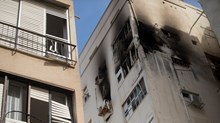As Sri Lanka's army struggles to halt a fierce onslaught from Tamil rebels in the north of the country, churches are praying for peace and giving their support to continuing efforts to end the conflict."Round-the-clock prayers are being said in churches by turn," the president of the National Christian Council (NCC) of Sri Lanka, Roy Rebeira, told ENI in a telephone interview on May 24 from Colombo, the capital. He added:"We have signed a statement today urging all churches to observe June 16 as a day of prayer for peace."The NCC groups Sri Lanka's mainstream Protestant churches-Anglicans, Baptists, Dutch Reformed, Methodists, Presbyterians, the Church of South India and the Salvation Army. Together these organizations have 130,000 members in a total population of about 18 million. Sri Lanka's biggest faith groups are Buddhist (69 percent) and Hindu (15 percent). About 8 percent are Christian and 8 percent Muslim.The call for prayer for peace has also been endorsed by the Evangelical Alliance of Sri Lanka (EASL)-which includes about 60,000 Christians in 40 member churches-and by dozens of smaller evangelical groups.The statement is the latest in a long series of urgent calls by churches and other faiths for more serious efforts to end the civil war. The Catholic Church, which accounts for nearly 85 percent of Sri Lanka's 1.3 million Christians, has already called for May 28 to be observed in churches as a day of prayer to resolve the 17-year ethnic conflict.Since 1983, members of the separatist rebel group, the LTTE (Liberation of Tigers of Tamil Eelam-known as the Tamil Tigers), have been waging war against rule by the Sinhala-speaking Buddhist majority in Sri Lanka. Nearly 100,000 people have been killed in the conflict. Tamil majority areas in northern and eastern parts of the island remain under the control of LTTE rebels. (Although Tamils comprise less than 20 percent of Sri Lanka's population as a whole, they represent the majority population in the north and east of the island.)The Tamil Tigers launched a fierce bid in late March to gain control of the Jaffna peninsula in the north. In two months of intense fighting, 30,000 Sri Lankan soldiers in the peninsula have suffered heavy casualties and are in danger of being surrounded by the LTTE.The NCC warned on May 6 that"the prospect of more wasteful loss of lives among young Sri Lankans in the opposing forces and among civilians looms large.""We believe that a bloody battle for the rest of the Jaffna peninsula is not in the interests of any of the communities of Sri Lanka. We call upon the government of Sri Lanka and the LTTE to engage in immediate talks leading to a cessation of hostilities and the commencement of serious, bona fide negotiations leading to a political settlement of the ethnic conflict," the NCC said in a statement signed by heads of member churches.On May 14, in a joint appeal, the Congress of Religions which represents the NCC, Catholics, Buddhists, Hindus and Muslims also called for the peaceful resolution of the conflict. A statement described the situation in Jaffna as"precarious … with both the LTTE and the government [army] locked in a mortal conflict determined to fight it out to the bitter end with horrendous consequences for both sides and the innocent civilians."The statement, whose signatories included the NCC president and two prominent Buddhist monks, appealed to political parties"to show genuine concern" and"eschew one-upmanship" in responding to ongoing peace discussions supported by the governments of Norway, India and the United States.On May 16, Nicholas Marcus Fernando, Catholic Archbishop of Colombo, said in an urgent message that"every Sri Lankan is today distressed and concerned about his motherland.""In this hour of dire need we show our solidarity by resuming in earnest the prayer to Our Lady for peace in our country after every Mass," said Archbishop Fernando, a former president of the Catholic Bishops' Conference of Sri Lanka (CBCSL)."We are concerned not only about the fighting itself but its impact on the civilian population, especially in Jaffna," said Bishop Oswald Gomes, current president of CBCSL.Talking to ENI on May 24 from his diocesan office in Anuradhpura, on Sri Lanka's west coast, Bishop Gomes said that"most of the people here [in Sri Lanka] feel that there should be a negotiated settlement at the earliest. We cannot go on like this."According to The New York Times, officials in New Delhi said the Indian government was prepared to make its navy available to evacuate 30,000 Sri Lankan soldiers from the Jaffna Peninsula, which is close to the south coast of India. An Indian spokesman said the navy had two ships standing by, but they would only intervene if a cease-fire were declared in the peninsula. However, the newspaper report said the Colombo government was not ready to withdraw, even though"the boastful declarations of military and political leaders that the country would fight to the last man to defend Jaffna are sounding more tentative as the fighting continues."Copyright © 2000 ENI.
Related Elsewhere
See continuing coverage of the Tamil conflict from Sri Lanka News Web, the BBC, India Today, and Yahoo's full coverage
Copyright © 2000 Christianity Today. Click for reprint information.

Annual & Monthly subscriptions available.
- Print & Digital Issues of CT magazine
- Complete access to every article on ChristianityToday.com
- Unlimited access to 65+ years of CT’s online archives
- Member-only special issues
- Learn more
Read These Next
- Trending
 While we pray for peace, we need moral clarity about this war.
While we pray for peace, we need moral clarity about this war. - From the Magazine
 A Christian reconciliation group in Israel and Palestine warned that war would come. Now the war threatens their relevance.españolالعربيةFrançais
A Christian reconciliation group in Israel and Palestine warned that war would come. Now the war threatens their relevance.españolالعربيةFrançais - Editor's Pick
 C.S. Lewis recommended discernment over diatribes in exactly the moments we’re most eager to indulge in critique.
C.S. Lewis recommended discernment over diatribes in exactly the moments we’re most eager to indulge in critique.













